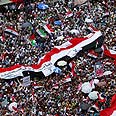
Egypt's military rulers dismissed complaints from protesters on Friday that it was entrenching its rule and blamed the Muslim Brotherhood's presidential candidate for stirring up emotions that drew thousands onto Cairo's Tahrir Square.
The Islamist candidate, Mohamed Morsi, shot back that the generals were defying the democratic will of the people and said protests would go on. But he stopped short of repeating a claim to have won last weekend's election, urging simply a rapid announcement of the result, and praised the army as "patriotic".
Related stories:
- Op-ed: Mr. Morsi goes to Cairo
Egypt delays poll results, ousted president in coma
Op-ed: Israel’s Sinai catastrophe
In a brusque four-minute statement read on state television as Egyptians returned from weekly prayers - and as the revolutionary bastion of Tahrir was chanting for democracy - the Supreme Council of the Armed Forces (SCAF) made clear it had no plan to heed calls to cancel a decree extending its powers or reverse its dissolution of the new, Islamist-led parliament.
"The issuance of the supplementary constitutional decree was necessitated by the needs of administering the affairs of the state during this critical period in the history of our nation," the off-screen announcer said, in the bureaucratic language favored by the generals who pushed aside brother officer Hosni Mubarak last year to appease the angry millions on the streets.
In what were menacing tones for the army's old adversary the Muslim Brotherhood, SCAF said people were free to protest - but only if they did not disrupt daily life.
At Tahrir, the broad traffic interchange by the Nile in central Cairo was filled with makeshift tents offering shade from the midday sun, hawkers offering an array of goods from tea to "I Love Tahrir Square" T-shirts. Many knelt in prayer during the weekly service. Large groups of pious Islamists were bussed in from the provinces by their parties.
The crowd chanted and waved Egyptian flags.
The deadlock between Egypt's two strongest forces raised grave doubts on the prospects for consensual democracy, though some see possible compromise, if Morsi does become president.
The SCAF statement read: "Anticipating the announcement of the presidential election results before they are announced officially is unjustifiable, and is one of the main causes of division and confusion prevailing the political arena."
It also said the army had no power to repeal the dissolution of parliament, saying that was down to judges who ruled some of January's election rules unconstitutional. Critics say the judges were appointed under Mubarak and are not impartial.
Protests
The Brotherhood is mounting protest vigils on town squares to demand the reversal of the decree and the dissolution. It also fears a delay in announcing the result of the presidential election indicates an attempt to cheat - though opponents say it is the Islamists who are not playing fair.
Morsi and former general Ahmed Shafik both say they believe they won the run-off ballot. But it is Morsi's declaration of victory within hours of polls closing - far more than Shafik's later, more cautious statements - which has driven debate about underhand tactics in a country long used to vote-rigging.
The delay in publication of results, due on Thursday but not now expected until at least Saturday, has heightened anxiety on all sides, although all sides say they will protest peacefully.
Morsi told a news conference he would continue to reject SCAF's decree, which was issued as polls closed on Sunday, two days after the constitutional court gave the military grounds to dissolve parliament: "The constitutional declaration clearly implies attempts by the military council to restrict the incoming president," he said. "This we totally reject."
But with no obvious resolution in sight to the stand-off, Morsi also made conciliatory references to the army: "There is no problem between us and our patriotic armed forces," he said.
"We do not agree to the issuing of the constitutional decree and neither do the people. Why do we need a supplementary declaration when we are going to draft a new constitution?"
After the blunt warning about declarations of election victory, Morsi notably did not repeat his claim to have won, but called instead for a speedy announcement to end the uncertainty.
- Receive Ynetnews updates
directly to your desktop















